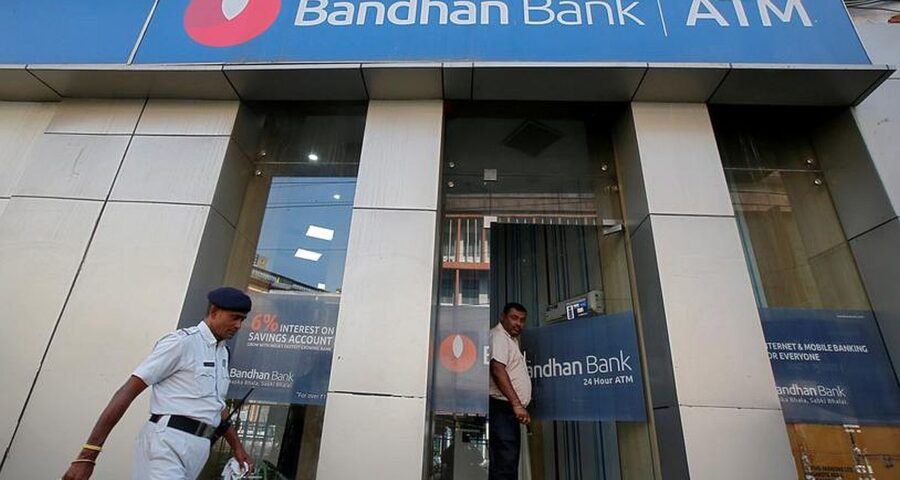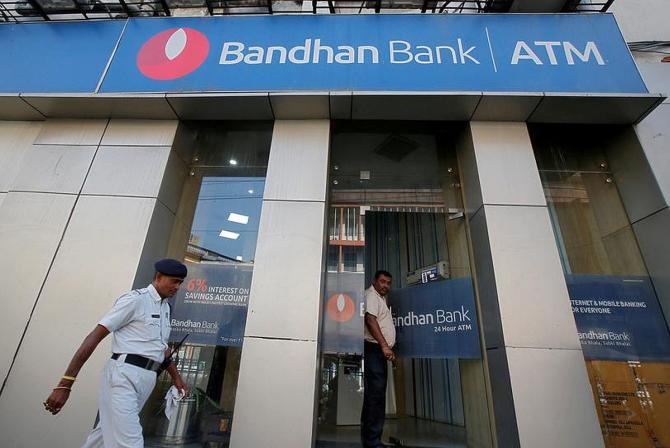Quite a few analysts are maintaining a ‘buy’ rating on the bank but they have downgraded earnings and RoA (return on assets) expectations and target prices.
Devangshu Datta reports.
Bandhan Bank has declared disappointing results for the first quarter of the 2023-24 financial year (Q1FY24).
While the market has been braced for known issues around microfinance exposures in West Bengal and Assam, there is higher stress in the portfolio.
This means higher credit costs and poorer asset quality, leading to target downgrades by analysts.
The Q1FY24 net interest income (NII) of Rs 2,490 crore was down 0.9 per cent year-on-year (YoY) and up 0.8 per cent quarter-on-quarter (QoQ).
The net interest margin (NIM) was stable at 7.3 per cent (down 70 basis points or bps YoY).
The bank guidance is for NIM of between 7-7.5 per cent in FY24 compared to 7.2 per cent in FY23.
The yield on assets improved by 60 bps QoQ to 13.3 per cent but the cost of funds also increased by 60 bps QoQ to 6.4 per cent.
Fee based and non-interest income was at Rs 380 crore (up 16.8 per cent YoY & down 39 per cent QoQ) with the dip in QoQ due to lower processing fees as disbursements declined 57 per cent QoQ to Rs 12,800 crore.
The operating expenditure (Opex) was at Rs 13,100 crore (up 28 per cent YoY) driven by a higher employee cost of Rs 810 crore (up 27.9 per cent YoY) and other Opex of Rs 500 crore (up 29 per cent YoY).
The bank added 2,419 employees and 141 new “touch points” in Q1FY24.
The pre-provision profit was Rs 1,560 crore, down 13 per cent YoY and down 14 per cent QoQ due to the weak non-interest income and high Opex.
Overall, provision declined to Rs 600 crore, translating to annualised credit cost of 2.4 per cent compared to 3 per cent in Q4.
The asset quality deteriorated with the gross NPA (non-performing assets) and net NPA at 6.76 per cent and 2.18 per cent, respectively, which was up 189 bps and 101bps QoQ, respectively.
The slippages include NPAs worth Rs 580 crore disbursed under the ECLGS, which is guaranteed by the government.
Gross slippages are around Rs 1,660 crore (excluding slippage from ECLGS) out of which Rs 220 crore is from housing loans.
The total provisions are for Rs 4,200 crore against total microfinance stressed assets of Rs 7,600 crore (GNPA+SMA 1/2), which is 56 per cent coverage.
The gross loan growth was 6.7 per cent YoY driven by micro finance (down 12 per cent YoY and housing (up 9.5 per cent YoY), commercial banking (up 78 per cent YoY) and other retail (up 86 per cent YoY).
Deposit growth was up 17 per cent YoY and flat sequentially (up 0.4 per cent QoQ).
The CASA (current and savings account) ratio declined to 36 per cent, down 3.3 per cent QoQ.
The collection efficiency stood at 98 per cent with 2 per cent majorly affected Maharashtra, Uttar Pradesh and Delhi.
The Assam floods have not had much of an impact.
During Q1FY24, the lender recovered Rs 226 crore from the ARC (asset construction companies) pool and Rs 42 crore from CGFMU (credit guarantee fund for micro units) loans.
Slippages are expected to reduce from Q2FY24.
The optimistic viewpoint is that Q1 is usually seasonally weak and slippages may have peaked though due to high stress levels.
However, recovery may be slow even if there’s visible improvement in Q2FY24.
Changes in the RBI’s (Reserve Bank of India’s) IRAC (income recognition and asset classification) norms have added to the reported slippages and NPA.
The stock of the lender closed 2.9 per cent lower, at Rs. 215.35 on Monday, following the results that were announced on Friday after market hours.
Since the end of May, the stock is down almost 20 per cent.
Quite a few analysts are maintaining a ‘buy’ rating on the bank but they have downgraded earnings and RoA (return on assets) expectations and target prices.
According to Bloomberg, 18 of the 22 analysts polled in July are bullish (‘buy’/’accumulate’/’add’/’outperform’ ratings), and two each are ‘neutral’ and ‘sell’.
Their average target price is Rs. 277.
Disclaimer: This article is meant for information purposes only. This article and information do not constitute a distribution, an endorsement, an investment advice, an offer to buy or sell or the solicitation of an offer to buy or sell any securities/schemes or any other financial products/investment products mentioned in this article to influence the opinion or behaviour of the investors/recipients.
Any use of the information/any investment and investment related decisions of the investors/recipients are at their sole discretion and risk. Any advice herein is made on a general basis and does not take into account the specific investment objectives of the specific person or group of persons. Opinions expressed herein are subject to change without notice.
Source: Read Full Article


